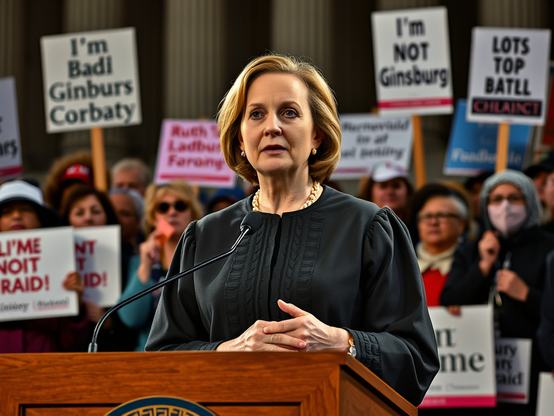As justices confront harassment, death threats and an assassination attempt, Barrett declares “I’m not afraid” – CBS News
Politics
As justices confront harassment, death threats and an assassination attempt, Barrett declares “I’m not afraid”
By Jan Crawford, Updated on: October 5, 2025 / 8:06 AM EDT / CBS News
Note: Below video via CBS News.
Whenever Justice Amy Coney Barrett arrived at an auditorium or a library or a university last month to discuss her new book, she encountered a familiar sight: protesters.
They lined the streets, chanting and carrying signs. One wore a handmaid’s costume, a symbol of oppression. Another was dressed as liberal icon Justice Ruth Bader Ginsburg, whose death in 2020 created a vacancy on the Supreme Court that President Trump would fill with Barrett.
For Barrett, protesters have become routine, another logistical wrinkle in her everyday life, much like the ones who regularly gather at her home outside Washington, D.C., where she lives with her husband and younger children. What surprises her, she told me in a wide-ranging interview in her chambers late last month, is how she can let it roll off her back.
“If I had imagined before I was on the Court, how I would react to knowing that I was being protested, that would have seemed like a big deal, like, ‘oh, my gosh, I’m being protested,'” she says. “But now I have the ability to be like, ‘Oh, okay, well, are the entrances blocked?’ I just feel very businesslike about it. It doesn’t matter to me. It doesn’t disrupt my emotions.”
A fury of protests against conservative justices erupted in 2022, when news leaked that the Court was poised to overturn the landmark decision Roe v. Wade. Barrett, a conservative in the mold of her former mentor and boss Antonin Scalia, was a particular source of ire. Replacing Ginsburg, whose legal career was grounded in women’s rights, she provided a key fifth vote to overturn Roe and let each state decide whether to allow abortion or not. But the decision also unleashed something much darker.
On Friday, a California resident was sentenced to eight years in prison for the attempted assassination of Justice Brett Kavanaugh, who also voted to overturn Roe. Court papers revealed the perpetrator had also mapped out the homes of three other conservative justices, including Barrett’s. Death threats have not gone away, and security remains high at their homes and whenever they appear in public.
I asked Barrett if she is ever afraid. Her response was immediate and emphatic: “I’m not afraid.”
“You can’t live your life in fear,” she continued. “And I think people who threaten — the goal is to cause fear. And I’m not afraid. I’m not going to reward threats with their intended reaction.”
That kind of mental discipline and self control, even in the face of threats and extreme criticism, reflects an outlook that has guided the 53-year-old Barrett much of her life.
“I don’t make decisions emotionally. I try very hard not to let emotions guide decisions in any aspect of my life. The way that I respond to people, the choices that we make,” she continues, adding with a laugh, “apart from maybe some impulse buys of clothes or something.”
That outlook is also reflected in her approach to the law.
On the Supreme Court, Barrett’s opinions are highly analytical. She doesn’t like to decide more than the issue at hand, which is one reason she has parted ways with conservative colleagues who would rather swing for the fences, like in a case two terms ago when the Court ruled states cannot remove Trump from the ballot. Barrett agreed on the bottom line, but had a more limited approach.
As a former law professor, she can be formalistic and technical, qualities that also can separate her from other conservatives, as in a 2024 case that attempted to hold the Biden administration responsible for suppressing speech on social media during Covid.
Now entering her sixth year on the Court, Barrett continues to defy stereotypes. Critics span the political spectrum, not only Democrats after she voted to overturn Roe, but more recently Republicans in the wake of decisions at odds with President Trump. She is “confounding the Right and the Left,” as the New York Times put it, raising hopes and fears on both sides.
That’s partly because, in decades past, some conservative justices have turned out to be anything but conservative. Would Barrett, too, go that route? And it’s also in part because of a fundamental misunderstanding about the Court, reflecting an idea that the justices are mere political actors who should stay on their respective sides, regardless of the law.
“That is a notion that I try to disabuse people of in the book,” she says.
Correcting some of those public misperceptions that the Supreme Court is driven by politics or outcomes or is loyal to Trump is one of her main goals with her new book, “Listening to the Law.” She is part teacher, part tour guide, taking the reader inside the Court and highlighting some of its most controversial decisions to explain how the justices interpret the Constitution and the differences in conservative and liberal philosophies.
And there is no case more controversial than the 5-4 decision overturning Roe, Dobbs v. Jackson Women’s Whole Health. Barrett uses it to explain how she and the Court’s conservative majority interpret the Constitution with a method known as “originalism,” focusing on the Constitution’s original meaning, the way the public understood it when it was adopted.
Continue/Read Original Article Here: As justices confront harassment, death threats and an assassination attempt, Barrett declares “I’m not afraid” – CBS News
#2025 #America #AmyConeyBarrett #AntoninScalia #BookTour #CBS #CBSNews #DonaldTrump #Education #Health #History #JusticeBarrett #JusticeGinsburg #Libraries #LibraryOfCongress #Opinion #OverturningRoeVWade #Politics #Protestors #Resistance #RoeVWade #Science #SCOTUS #Trump


